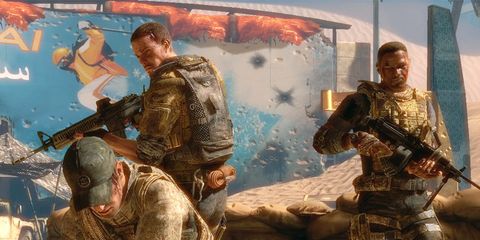


#Spec ops the line ps4 series
A forgettable budget series from the late 90s that failed to stand out among its brethren had suddenly reappeared as some sort of Apocalypse Now riff that deconstructed not only the modern military shooter, but the relationship between games and the player, alongside showers of political commentary over US military culture. Despite a distaste for military shooters, thanks partly due to his experiences in military school, he agreed, hungry for his own game to shape, one he could call his own.Īfter six years of development hell, with management suggesting more and more features to bloat the project whenever completion seemed near, Spec Ops: The Line hit store shelves and completely surprised audiences. His new script was thrown out due to being an act of vanity that was too late to implement, but was impressive enough to offer him a top spot on a series reboot of Spec Ops. In 2006, a grunt worker and aspiring writer at 2K Games named Walt Williams was approached by his boss after his frustrating dealings in trying to rewrite Bioshock 2. The budget game garnered no fanfare or critical praise, and the franchise quickly vanished, only popping back up for a short blip when Rockstar mentioned rebooting the series when they gained the license, only to abandon the idea. The game got an expansion pack and a sequel from the studio in 1999, while a total of six (!) budget titles from smaller studios (including Runecraft, creators of that hit classic Barbie Super Sports) released from 2000 to 2002.

Spec Ops appeared in the gaming world with Zombie Studios’ Spec Ops: Rangers Lead the Way, one of many tactical shooter franchises to appear in 1998, and one of many who fell to the grueling realism of Tom Clancy’s Rainbow Six. Also it didn’t sell.There are only two truly notable games in the Spec Ops series, the first and the last. In a 2012 piece on Polygon, Cory Davis, the lead designer, described the multiplayer on it as ‘a cancerous growth’ and that ‘the game mechanics were raped to make it happen, and it was a waste of money.’ Ouch for the multiplayer.īecause it was a brutal, painful development & everyone who worked on it would eat broken glass before making another. This isn’t the first time the Spec Ops team has been open about their feelings on the development process. As the game’s lead writer, Williams is responsible for one of the most unique stories a shooter has ever had, but fans of it are just going to have to keep replaying the original. ‘Because it was a brutal, painful development & everyone who worked on it would eat broken glass before making another. One such person asked writer Walt Williams why it won’t get a sequel, and Williams gave a pretty clear cut reply.

It wasn’t a commercial blockbuster, though, although a lot of people still think of it fondly. Spec Ops: The Line was a shooter with a difference, and what precisely that difference was I’m not going to spoil for you, because it was pretty cool (but suffice it to say: check out Spec Ops: The Line).


 0 kommentar(er)
0 kommentar(er)
